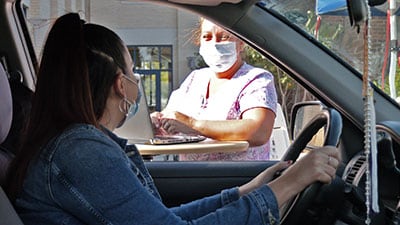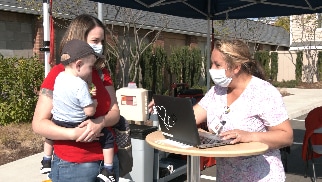Protecting a Community Against Flu: A Resilient Model During Difficult Times
Updated November 16, 2020

Community Health Center, Inc. patient arrives at drive through flu vaccination clinic.
As the weather begins to chill and flu season begins, health centers nationwide are preparing to vaccinate as many people as possible against flu viruses. Given the challenges posed by the COVID-19 pandemic, many are finding creative and innovative ways to approach flu vaccination.
With over 200 sites throughout Connecticut, Community Health Center Inc., or CHC, typically helps more than 100,000 patients each year with a range of services. Their model makes care available to all people. However, CHC focuses on key populations that traditionally have low health system use and face barriers to care, including people experiencing homelessness, migrant workers, and children in foster care.
For CHC, providing care to these key populations has always required innovative solutions. CHC leadership frequently keeps in contact with health centers nationwide to discuss complex care management and collaborate on ways to reach patients. This connection with organizations across the country provides opportunity to ensure their programs are more resilient and increase morale for staff through supportive conversations with others who do this important work.
CHC uses every patient interaction as an opportunity to offer flu vaccination. “No matter how the patient is approaching the health center, whether for dental, medical or behavioral care, we will go ahead and recommend vaccinating,” said Mary Blankson, chief nursing officer for CHC.

A mother discusses flu vaccination with a CHC healthcare provider at a drive-through clinic.
Additionally, CHC started operating drive-through flu vaccination clinics in August to address patient fears that coming to the health center would expose them to COVID-19. “Patients are afraid, and many prefer telehealth,” said Blankson. “But you can’t vaccinate over the phone.” These new flu vaccination clinics are open 8:30 a.m. to 4:00 p.m. Monday through Friday. Nearly half of the 18,000+ influenza vaccines given by CHC in 2020 have been through the new drive-through flu clinics. This is a departure from previous years, when most flu vaccines would have been given at either primary care or other visits. CHC also provides COVID-19 testing at these flu clinics to maximize the ability for patients to receive services. The service has proven popular, with most days averaging more than 2,000 COVID-19 tests administered.
What began as an effort to make vaccines accessible to those fearful of COVID-19 exposure has transformed into a model of resiliency. These special flu vaccine clinics have reached more people in the community than before.
One population that CHC focuses on is young children. Around half of CHC’s patients are under 18 years old. Some children 6 months to 8 years old require two doses of flu vaccine for adequate protection from flu. These doses are typically spaced about 4 weeks apart. The success of CHC in completing the two-dose series for their patients will be useful in planning for COVID-19 vaccination efforts since most COVID-19 vaccine candidates require two doses.
“We are learning what it may look like for an eventual COVID-19 vaccine,” said Blankson, who has been working with CHC for 15 years. Blankson emphasized that the lessons learned during this flu vaccination campaign will be applied to an eventual strategy for CHC to vaccinate under-resourced and disproportionately affected communities when a COVID-19 vaccine is widely available.
“We have always actively reached out to engage and bring all patients in for flu vaccine, but this year it is absolutely urgent—and there’s the added concerns of patients about coming on-site given the focus on social distancing,” said Margaret Flinter, CHC’s senior vice president and clinical director. She explained that CHC is using flu vaccine encounters as an opportunity to educate patients about how the virus that causes COVID-19 spreads and ways to protect themselves. They also use social media to answer common questions they receive about flu, COVID-19, and routine vaccinations.
An additional component of CHC’s mission is to provide opportunities for employment and workforce training in the community. Due to the increased demand for flu vaccines this fall and the goal to continue providing a high volume of vaccination services to the community through the end of flu season in 2021, CHC has hired a dozen licensed practical nurses (LPNs) and several registered nurses (RNs) to assist with vaccine preparation and planning. Their mobilization was so efficient that when CHC received their flu vaccine stock in mid-August, their nurses were out vaccinating community members the very next day.
Ultimately, CHC works on creating an experience for their patients that fosters trust and open communication. “Trust comes from a good experience,” said Flinter. “We want to make it feel personal.” Supporting their patients with good experiences can also help with conversations around vaccine acceptance, emphasizing open and friendly communication. Many patients come in for problems that are not directly related to flu and do not expect to get a vaccination that day. “We think of it as more than a shot in the arm,” said Blankson. “We want patients to feel supported and scaffolded by all our services. Vaccinating against flu is an important component to keep the community healthy.”
